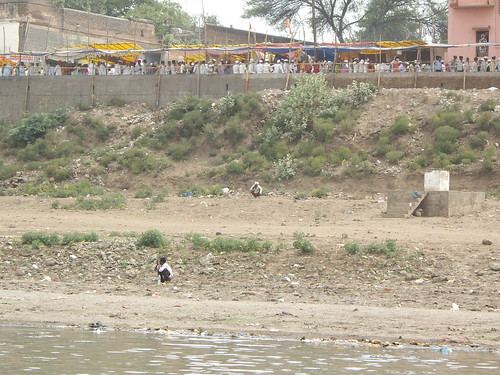And then there is that other shit that I am passionate about. You know about that too--the lack of sanitation infrastructure for hundreds of millions in South Asia and sub-Saharan Africa. "If only we can develop less expensive ways of processing shit." Aha, now you remember.
Do you recall the challenge from the Bill and Melinda Gates Foundation to reinvent the toilet?
In a recent entry at his blog, Bill Gates writes:
I watched the piles of feces go up the conveyer belt and drop into a large bin. They made their way through the machine, getting boiled and treated. A few minutes later I took a long taste of the end result: a glass of delicious drinking water.Yes, things are happening, even if only slowly. It is "part of the Gates Foundation’s effort to improve sanitation in poor countries."
Because a shocking number of people, at least 2 billion, use latrines that aren’t properly drained. Others simply defecate out in the open. The waste contaminates drinking water for millions of people, with horrific consequences: Diseases caused by poor sanitation kill some 700,000 children every year, and they prevent many more from fully developing mentally and physically.The system that we have in this country, or many other countries, is expensive. It requires sewer lines, sewage treatment plants, qualified personnel, and--to get the system running--electricity, which itself is in serious shortage.
If we can develop safe, affordable ways to get rid of human waste, we can prevent many of those deaths and help more children grow up healthy.
So, if only a re-invented toilet will extract the water from shit and make it potable, and use the carbon in the shit to generate electricity. My, won't that be multiple birds with one stone?
The project is called the Omniprocessor, and it was designed and built by Janicki Bioenergy, an engineering firm based north of Seattle. ...If it were not for Gates Foundation providing the seed money, such efforts to reinvent the toilet might not have even begun? Isn't that a depressing thought? To me, this is an example of how we misdirect our talents and capabilities. We spend enormous amounts on wars. We develop technologies to send humans to the moon and bring them back. We spend gazillions on sports stadiums that consume more electricity than entire countries in sub-Saharan Africa do. All these mean that we have the know-how and the resources. But, we merely choose to spend on things than what are really, really important for humans.
Through the ingenious use of a steam engine, it produces more than enough energy to burn the next batch of waste. In other words, it powers itself, with electricity to spare.
The next step is the pilot project; later this year, Janicki will set up an Omniprocessor in Dakar, Senegal, where they’ll study everything from how you connect with the local community (the team is already working with leaders there) to how you pick the most convenient location. They will also test one of the coolest things I saw on my tour: a system of sensors and webcams that will let Janicki’s engineers control the processor remotely and communicate with the team in Dakar so they can diagnose any problems that come up.When we talk about the "internet of things" we are only fascinated with examples like how our refrigerators can keep track of the inventory and how an automated drone can deliver milk that a robot will load up in the fridge. Because, all we do is gaze at our own navels! What a contrast the Dakar project is--the connectivity that the internet offers is put to such a constructive use.
I will leave it to Bill Gates to wrap this up:
It might be many years before the processor is being used widely. But I was really impressed with Janicki’s engineering. And I’m excited about the business model. The processor wouldn’t just keep human waste out of the drinking water; it would turn waste into a commodity with real value in the marketplace.Here's the video of the project and Gates drinking the potable water that was once a part of shit. Give this man a Nobel Peace Prize already!


 From the BBC
From the BBC